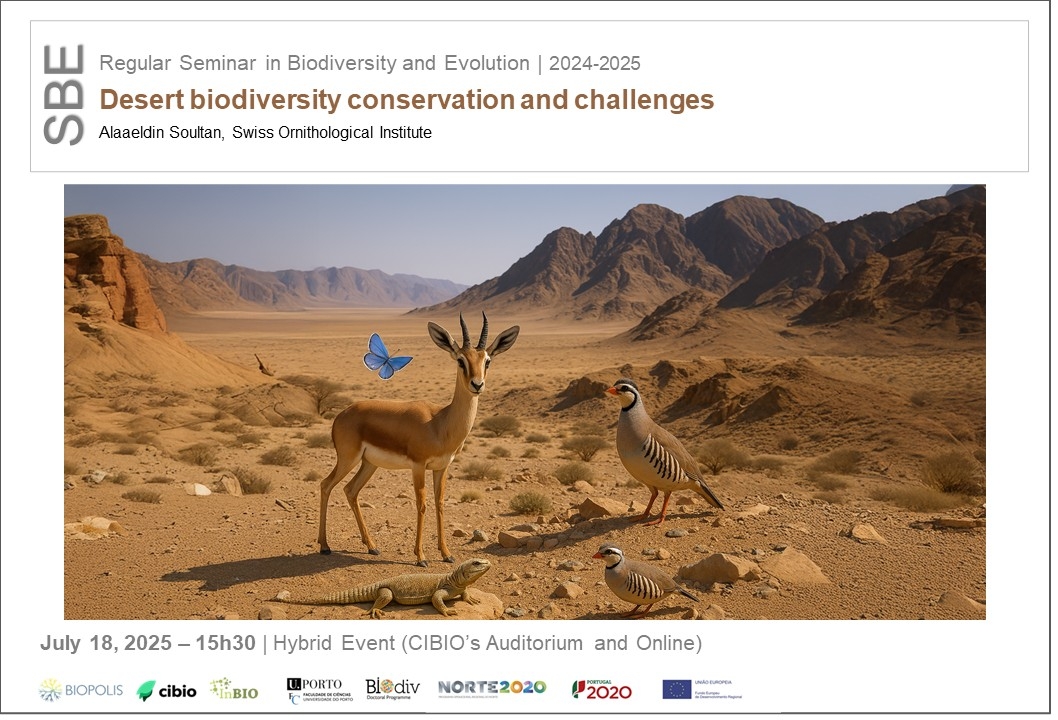Desert biodiversity conservation and challenges
18 Jul 2025 - Alaaeldin Soultan, Swiss Ornithological Institute | 15h30 | Hybrid Seminar

REGULAR SEMINAR IN BIODIVERSITY AND EVOLUTION
The Sahara and Arabian Deserts, collectively the largest warm desert region on Earth, encompass approximately 17% of the planet's total landmass. Despite their vast expanse, these deserts have historically been overlooked by conservation communities. However, they are home to roughly one-quarter of the world’s terrestrial vertebrate fauna, many of which are endemic species uniquely adapted to survive in harsh environmental conditions. The biodiversity patterns of these desert ecosystems have been profoundly influenced by the long-term biogeographical connectivity between Africa and Asia, which facilitated significant faunal interchange over millennia. This historical dynamic has shaped the unique assemblage of species found in the region today. This presentation will explore how climate change is expected to alter the distribution ranges of desert species and the implications of these changes for the conservation of endemic mammals. Using case studies, the talk will highlight key ecological and conservation projects aimed at preserving desert biodiversity. For instance, it will examine habitat selection patterns of the Dorcas gazelle (Gazella dorcas), an iconic desert-adapted ungulate, and the conservation efforts targeting the endemic Sinai Baton Blue butterfly (Pseudophilotes sinaicus), one of the world’s smallest butterflies. Finally, the presentation will address the multifaceted challenges facing biodiversity conservation in desert habitats. These include limited resources for conservation initiatives, increasing anthropogenic pressures, and the compounding effects of climate change on already fragile ecosystems. By shedding light on these issues, this talk aims to highlight the urgent need for greater attention and action toward conserving the unique biodiversity of desert regions.
Dr. Alaaeldin Soultan is an ecological modeler and conservation scientist specializing in desert and arid ecosystems. He holds a Ph.D. in Ecological Modelling from the Max Planck Institute for Ornithology, where he studied the biogeography and conservation of endemic biodiversity in the Afro-Arabian region. His research applied spatial modeling approaches to guide conservation planning under climate change. He previously worked as a researcher at the Royal Commission for AlUla in Saudi Arabia, where he led projects on wildlife movement, spatial connectivity, and habitat suitability to support conservation and restoration in desert landscapes. He also developed data systems to manage biodiversity information and inform land-use planning. Currently, Dr. Alaaeldin is a postdoctoral researcher at the Swiss Ornithological Institute, focusing on integrating species and environmental data to assess climate and land-use impacts on bird populations. His work combines ecological modeling, remote sensing, and large-scale biodiversity data to support conservation decision-making in vulnerable ecosystems.
[Host: José Carlos Brito, Biodiversity of Deserts and Arid Regions - BIODESERTS]
Zoom Link: https://videoconf-colibri.zoom.us/j/99797933081
Zoom Link: https://videoconf-colibri.zoom.us/j/99797933081